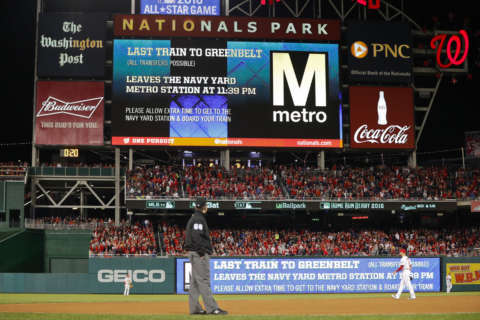WASHINGTON — In 2012, Living Social stepped up to the plate to pay for extended Metro service so that fans could attend the Washington Nationals’ playoffs.
This time around, Exelon — the Chicago-based utility firm that is the parent company of Pepco — is paying the tab for the extended Metro service.
Richard Auxier, a research associate at the Urban Institute, said it’s not an unusual arrangement.
“For example, in Minnesota, Miller Lite — on St. Patrick’s Day — made it so that anyone going out to enjoy the holiday could take advantage of their transportation system for free,” which, Auxier said, allowed people to head downtown, patronize the bars and get home safely.
“So there’s nothing wrong with a private company helping a public transit system stay open,” he said.
But Exelon is in the position of going before D.C.’s Public Service Commission — the utility’s regulator — which can either approve or deny rate increase requests from utilities.
When asked if the payment from Exelon to keep Metro running Thursday night puts either the District or its commission in a sticky ethical position, Auxier said, “Not on the face of it.”
But he added, “It’s something that should be transparent” in that the public should be able to understand the terms of the agreement.
The broader problem, Auxier said, is that many cities struggle to finance infrastructure like public transit. But unlike transit in other cities, Metro doesn’t have dedicated funding.
“Now, dedicated funding’s not a cure-all because you still have to set the taxes high enough so that you’re funding the system. But not having that puts the District at an even further disadvantage,” Auxier said.
At a time when D.C. is striving to attract more businesses and major players like Amazon’s HQ2, Auxier said having a system that shuts down before major events end — unless businesses step in to cover the cost — creates complications and raises issues about reliability.







